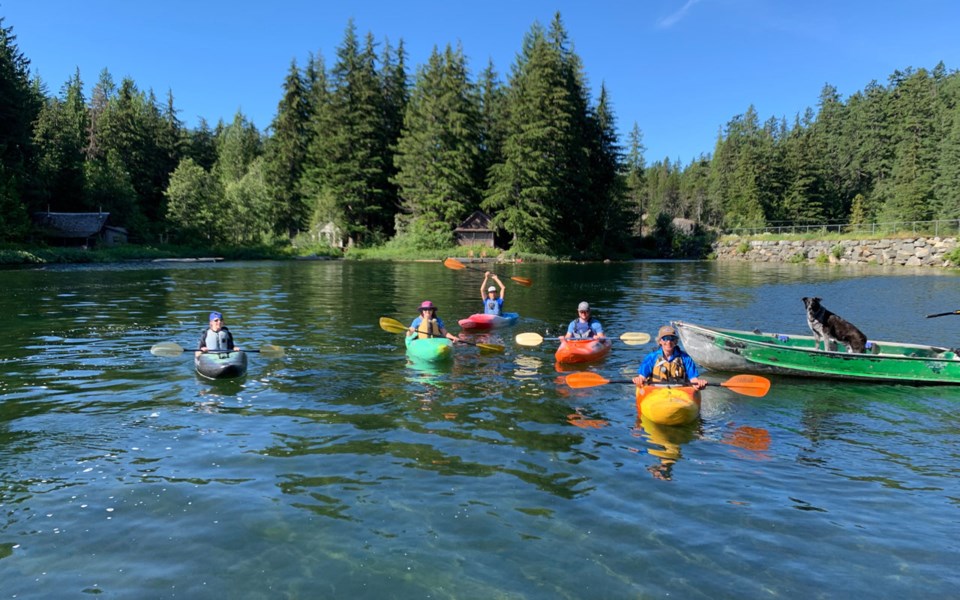The ongoing COVID-19 pandemic created myriad challenges for Whistler Adaptive, but the local sports organization managed to come through for its athletes.
Executive director Chelsey Walker said the organization has offered in-person classes since June 15, hosting hiking, biking, kayaking, paddleboarding, rowing and physical literacy programs in Squamish, Whistler and Pemberton.
“We had some challenges and we had to reimagine how we deliver our programming,” she said. “We had probably one of our busiest summers ever because we had so many locals look to do programming.”
Because the classes were offered either as a single-person session or within smaller bubbles, Whistler Adaptive held 70 sessions per week, up from 20 a week in a typical summer.
“It was definitely a big increase in volume and logistics, but we were able to successfully get a whole bunch of new individuals into programs from all three communities, so that was really exciting,” she said.
Walker observed that people were happy to get out of isolation and away from the screens, as Whistler Adaptive had quickly shifted to Zoom sessions after suspending in-person programming in the spring.
“What we found was by moving into neutral areas where they weren’t in their typical habits at home was a benefit, to move them into a new place where we could teach them a new routine,” she said.
Complicating matters, Walker said, was that the organization was only able to apply for the Canada Emergency Wage Subsidy as of last week after negotiating through the summer.
As a result, the organization had limited staff throughout the summer, but had enough qualified volunteers to make the programming happen.
“[We’ve had] new volunteers who have been absolutely a lifesaver in terms of coming out and assisting our coaches so we have two screened adults in every session,” Walker said.
While the organization had to keep an eye on cash flow, Walker was reassured by conversations with MP Patrick Weiler in which he pledged that changes were coming.
Whistler Adaptive will look for another shot in the arm after losing its annual spring fundraiser, as it will host an online gala on Oct. 15. Walker has been thrilled to see strong support among local merchants.
“It’s been absolutely heartwarming to see our local business community, as hard hit as they have been, respond to our need to raise funds and keep our doors open,” she said.
With a further loosening of restrictions as viaSport moves into Phase 3 of its Return to Sport plan as of Aug. 24, Whistler Adaptive was getting set to meet with its partners the evening of Aug. 25 to figure out what that move means for its programming this autumn.
“Most likely, the programming we’ll be offering is going to be very similar to summer. It’s going to be community-based to regional,” Walker said. “It will be focused on our Sea to Sky [members].”
With the broad base of programming Whistler Adaptive offers, it has to consider each sport with its own provincial sport organization, as well as balance differing abilities and the wide age range of those it serves.
Meanwhile Mark Freeman, head coach of the Whistler Youth Soccer Club, said the organization just finished its seven-week summer program for kids in programs from under-six to under-17, run under BC Soccer and viaSport’s guidelines.
Among the adaptations was that every player had to stay within a specially painted box during the sessions on-field at Myrtle Philip Community School.
“It was something I’d not coached with before, so it was very different,” Freeman said. “It’s not what the children were used to, but in terms of individual skill development, touch on the ball, and those kinds of things, it was actually very productive.”
As a result, drills could include no tackling, no contact, and no use of hands, though players could pass the ball backwards and forward between boxes.
As well, younger players had to have a parent in attendance, though Freeman described this as a benefit, as parents could help quickly interpret and supervise the drill for their child, meaning that skill development was much more efficient.
Freeman enjoyed returning to the field after not having coached for months, and even with the stark changes, observed similar excitement in the players.
“They wanted to get out. They wanted to socialize. They wanted to be with other kids and be out playing again,” he said.
In terms of response, most sessions were fully booked, Freeman said.
“It was better received than I thought it was going to be,” he said, noting many families that would typically be holidaying stayed put and needed programming for the kids.
When programming resumes in Whistler after Labour Day, it will look a bit more like a traditional game as a result of viaSport moving into Phase 3. Freeman is coaching at a camp in Vancouver this week, and noted changes were implemented as soon as they were announced during lunchtime of the Aug. 24 session. Contact between players in a group is now allowed, and games with small teams are now allowed.
Should restrictions lift in the next couple months to allow for full games, Freeman is hopeful that there can be some competition before the calendar flips.
“With the turf field now [at Bayly Park], last year, we were training until Christmas Eve,” he said.




